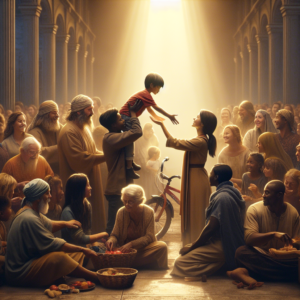Introduction: Unveiling the Layers of Frankenstein
Welcome to a journey of discovery, where classic literature meets timeless wisdom. Mary Shelley’s “Frankenstein” is not just a tale of science and speculative fiction but a reservoir of profound lessons that resonate with biblical principles. At the heart of this narrative are themes of creation, responsibility, and the quest for meaning—themes that mirror the essence of our spiritual walk.
The Act of Creation and its Consequences
In “Frankenstein,” we witness the fervor of Victor Frankenstein as he undertakes the creation of life, only to realize the grave responsibilities that come with it. This echoes the biblical act of creation, where God meticulously forms mankind and the universe with purpose and love, as stated in Genesis 1:27, “So God created mankind in his own image”. Unlike Victor, however, God commits to His creation, highlighting the importance of responsibility and care for that which we bring into the world.
- The power and responsibility of the creator over the created.
- The unintended consequences that arise from the act of creation.
- The ethical considerations in the exercise of creative power.
Navigating the Complexities of Responsibility
Victor’s neglect and abandonment of his creation lead to catastrophic outcomes, serving as a cautionary tale on the weight of responsibility. Scripture offers guidance on this theme, urging us to embrace responsibility with grace and wisdom. Ephesians 4:2-3 encourages us to, “Be completely humble and gentle; be patient, bearing with one another in love.” This verse underscores the importance of facing our obligations, not just to our creations but to each other, fostering an environment of care and accountability.
- Recognizing our responsibilities towards our creations and our peers.
- Understanding the consequences of neglect and indifference.
- Learning to act with wisdom, love, and humility in our relationships.
Seeking Redemption and Restoration
The journey of Frankenstein and his creature is a poignant exploration of the quest for redemption. Both creator and creation grapple with their failings and yearn for forgiveness and reconciliation, mirroring the biblical path of redemption. In Colossians 3:13, we find, “Bear with each other and forgive one another if any of you has a grievance against someone. Forgive as the Lord forgave you.” This powerful message of forgiveness serves as a cornerstone for healing and restoration.
- Embracing forgiveness as a path to healing and redemption.
- Understanding the power of grace and reconciliation.
- The transformative potential of forgiveness in our lives and relationships.
Conclusion: Drawing Inspiration from Frankenstein and Scripture
As we delve into the depths of “Frankenstein,” it becomes clear that within its pages lie not just a cautionary tale but a roadmap to a more fulfilling spiritual journey. By embracing the principles of responsible creation, navigating our duties with love, and seeking redemption, we can find a deeper connection to our faith and to each other. Let us take these lessons to heart and strive to live with purpose, empathy, and grace.
Are you ready to explore more about how classic literature and biblical truths intersect? Join us on this enlightening journey and discover new ways to enrich your faith and understanding. Dive deeper into the stories that shape us and the lessons we can learn from them.
If you want to learn how ANY book relates to Biblical principles, please try our Books and Scripture GPT. Simply type in the name of a book and let it show you insights you might not have been aware of!


